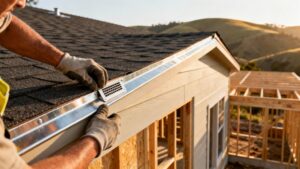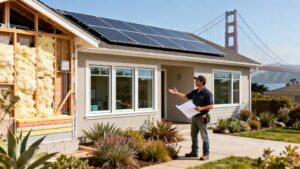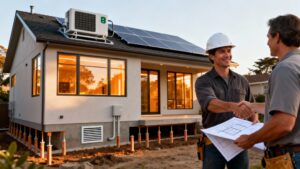Choosing an eco-friendly lumber supplier in the East Bay isn’t just about making a green choice—it’s a strategic decision for any builder, contractor, or homeowner. For projects in communities like Berkeley and Oakland, sustainable practices are woven into the local building culture. Sourcing the right lumber can elevate your entire project, streamline permitting, and boost property value.
Why Sustainable Building in the Bay Area Demands the Right Lumber
In the Bay Area, responsible building is a core value that impacts everything from regional environmental goals to our famously stringent building codes. Partnering with a dedicated eco-friendly lumber supplier in the East Bay means you get crucial expertise on how different materials perform in our specific climate.
This commitment reflects a larger shift. According to the U.S. Census Bureau, the value of new construction continues to grow, and with it, the demand for sustainable materials. Sourcing from a knowledgeable local supplier ensures your project aligns with both market trends and regional expectations.
Benefits of Choosing Sustainable Lumber in Berkeley and Oakland
When you choose sustainable wood, you’re investing in tangible benefits that reach far beyond the job site. It's a decision with real-world advantages for builders and homeowners alike.
- Meeting Local Green Building Codes: Cities like Berkeley and Oakland have robust green building ordinances. Using certified lumber helps ensure your project sails through permitting without costly delays.
- Enhanced Property Value: Bay Area buyers are savvy. Homes built with verifiably sustainable materials are a major draw, often commanding higher resale values.
- Healthier Indoor Environments: Materials like reclaimed wood or products with low-VOC (Volatile Organic Compound) finishes improve indoor air quality, a key selling point for health-conscious clients.
Of course, the blueprint is just as critical as the materials. Exploring eco-friendly house plans can provide inspiration for designs that align with these principles.
The right lumber choice impacts every phase of a project, from structural integrity to its long-term environmental footprint. An informed decision starts with understanding the fundamentals of green building in our region.
How to Understand Eco-Friendly Lumber Certifications
When you step into a lumberyard, the array of labels can feel overwhelming. For builders and architects in the Bay Area, knowing these symbols separates a guess from a guarantee that your materials are genuinely sustainable. This knowledge is key when selecting an eco-friendly lumber supplier in the East Bay.
It’s about understanding what each certification guarantees about the wood's journey from the forest to your job site. The most respected standard is the Forest Stewardship Council (FSC), a non-profit that sets the global bar for responsible forest management.
Decoding FSC Labels: 100%, Mix, and Recycled
Not all FSC labels are created equal. When you see the checkmark-and-tree logo, it will have one of three designations, each telling a different story about the wood.
- FSC 100%: This is the gold standard, guaranteeing every fiber comes from an FSC-certified forest audited against strict environmental and social criteria.
- FSC Mix: This label means the product is a blend of materials from FSC-certified forests, recycled content, and/or wood from "FSC controlled" sources.
- FSC Recycled: This label signifies that all the wood fiber in the product comes from 100% reclaimed material, reducing the demand for virgin timber.
This table breaks down the main certifications you'll encounter.
Comparing Top Eco-Friendly Lumber Certifications
| Certification | What It Guarantees | Best For |
|---|---|---|
| Forest Stewardship Council (FSC) | Ensures wood comes from responsibly managed forests that provide environmental, social, and economic benefits. Considered the most rigorous global standard. | Projects requiring the highest level of third-party verification for green building standards like LEED. |
| Sustainable Forestry Initiative (SFI) | A North American standard that certifies wood from forests managed to protect water quality, biodiversity, and wildlife habitats. | Sourcing North American lumber with a verified commitment to sustainable practices. |
| Programme for the Endorsement of Forest Certification (PEFC) | An international umbrella organization that endorses national forest certification systems. It promotes sustainable forest management through independent third-party certification. | Gaining access to a wide range of certified wood from various countries under a single, globally recognized framework. |
Having this knowledge helps you quickly assess materials and understand exactly what you're buying.
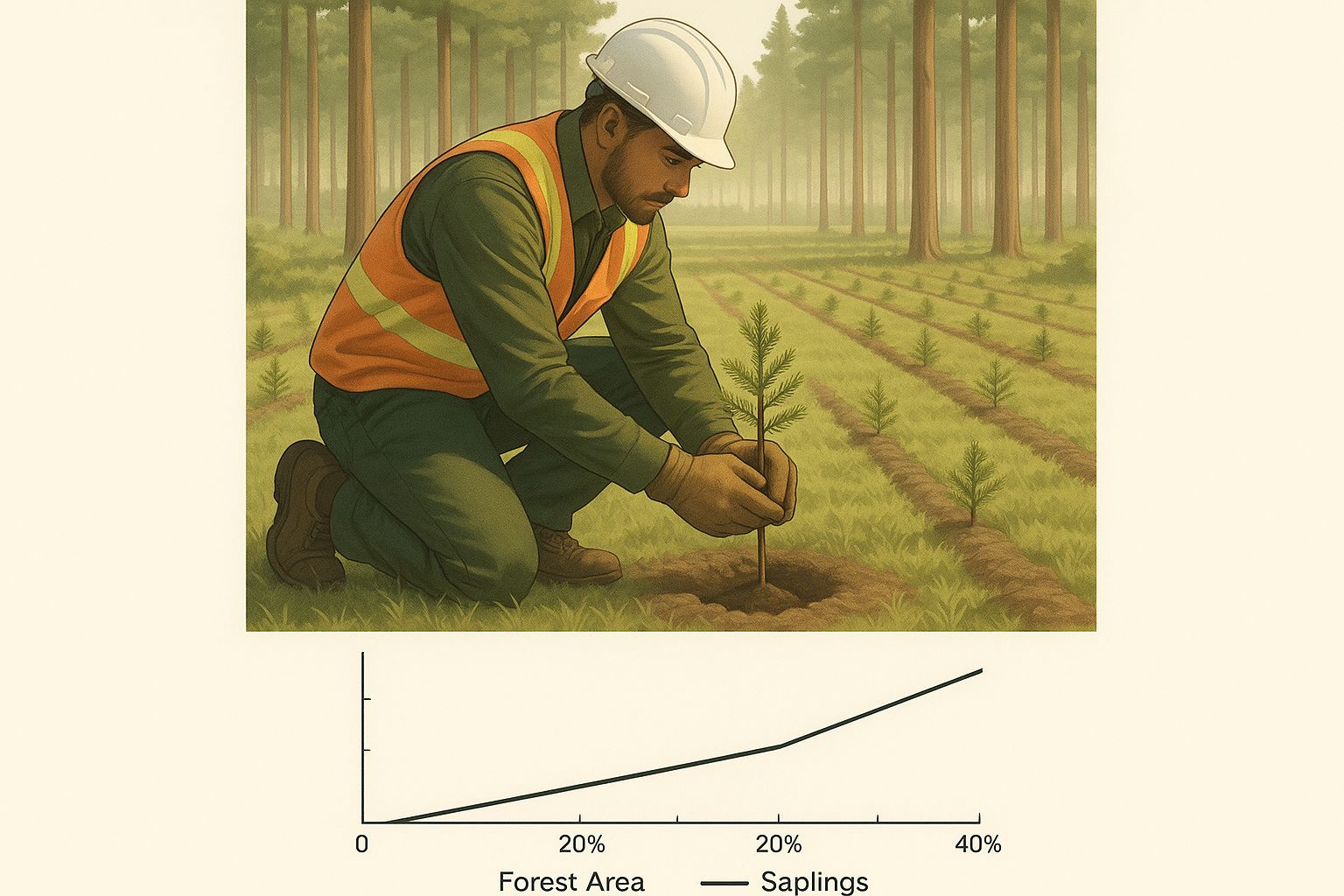
The principle of replanting is fundamental to how certifications like FSC work, ensuring a renewable supply chain for builders in Oakland, Berkeley, and the greater Bay Area.
The Importance of Chain of Custody (CoC)
A logo is a great start, but for true verification, ask your supplier about their Chain of Custody (CoC) certification. This is the documented paper trail tracking raw materials from the forest to the final product.
A supplier with a valid CoC certificate can prove that FSC-certified products have been tracked correctly at every step. Asking for this documentation isn't being difficult—it’s your ultimate proof of authenticity.
This certificate is essential for contractors and architects needing to hit specific green building targets for a project. To see these principles in practice, explore our inventory of quality lumber for the East Bay and the certified options we stock.
Exploring Types of Sustainable Wood and Materials
Beyond standard certifications, a world of innovative sustainable lumber awaits. For any contractor or architect in the East Bay, knowing these materials is what separates a good project from a great one.
The Character of Reclaimed Lumber
One of the most compelling options is reclaimed lumber. This is wood salvaged from old structures like decommissioned bridges, barns, or warehouses in places like Oakland. Each plank brings a unique history—weathered patinas, old nail holes, and deep colors that new wood can't replicate.
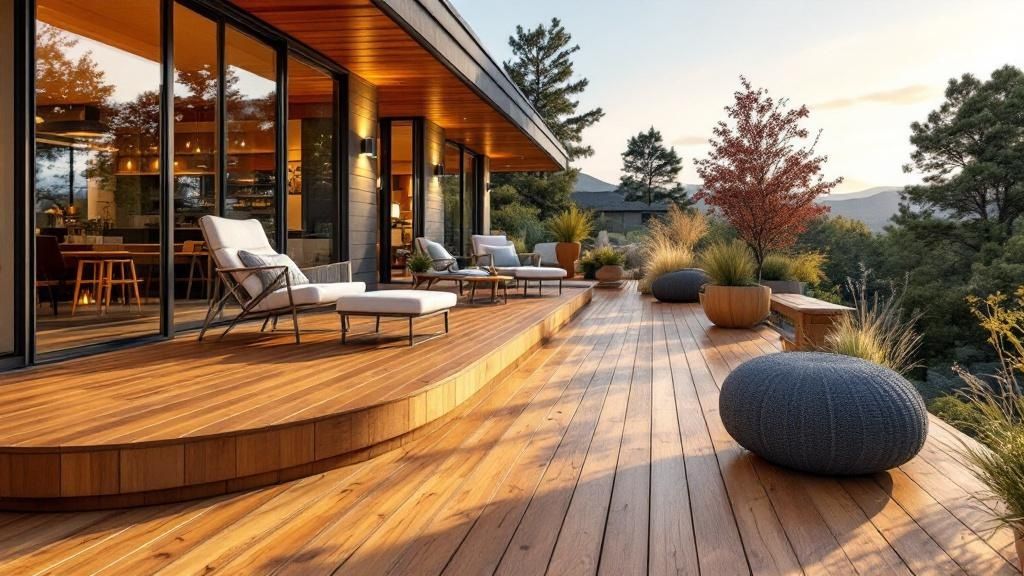
Using reclaimed wood keeps high-quality lumber out of landfills and reduces the pressure on harvesting new trees. The global reclaimed lumber market is projected to hit USD 83.53 billion by 2034, showing clients want materials with a story and a lighter footprint. You can review the data in this industry research on the reclaimed lumber market.
The Performance of Engineered Wood
High-performance engineered wood offers incredible strength, stability, and resource efficiency. These are not standard-issue plywoods but advanced structural materials.
- Glued Laminated Timber (Glulam): These "super-beams" are made by bonding layers of dimensional lumber together. Glulam is remarkably strong and can be made in custom shapes, making it a sustainable replacement for steel or concrete.
- Cross-Laminated Timber (CLT): Made from layers of solid-sawn lumber stacked in alternating directions, CLT panels are exceptionally strong yet lightweight. They are perfect for floors, walls, and roofs in modern Bay Area builds.
These products optimize wood fiber by often using smaller pieces from younger, faster-growing trees.
The Speed of Rapidly Renewable Materials
Materials that grow back much faster than timber are excellent choices for specific applications, like interior finishing.
Bamboo and cork are two key players. Both are processed into building materials that perform like wood and are fantastic for flooring, wall panels, and cabinetry.
Their rapid growth cycles make them a highly sustainable choice for projects in places like Berkeley or San Francisco where clients seek innovative, low-impact materials. See these options for yourself in our full inventory at our lumber yard serving the San Francisco Bay Area.
Key Questions to Ask Your East Bay Lumber Supplier
Choosing the right eco-friendly lumber supplier in the East Bay is about finding a partner who shares your commitment to sustainability and has the hands-on experience to prove it.
To get past the buzzwords, you need to ask a few pointed questions. This will tell you everything about their practices, transparency, and whether they're the right fit for your job in Berkeley or Oakland.
Verifying Sourcing and Certification
A supplier serious about sustainability will have no problem backing up their claims with documentation.
- "Can I see the Chain of Custody (CoC) documentation for this FSC-certified wood?" The CoC paperwork proves the lumber’s journey from a certified forest to their yard.
- "Where did this reclaimed lumber come from?" A great supplier knows the story behind their wood, whether it’s from an old Oakland warehouse or a barn in Northern California.
- "What percentage of your inventory is certified or reclaimed?" This question gives you a clear idea of their real commitment to sustainability.
As you budget for your project, you can use a construction material cost predictor to get a baseline for market rates before placing an order.
Assessing Local Expertise and Business Practices
A supplier's knowledge of Bay Area conditions and their own operational footprint are just as crucial as the products they sell.
A truly eco-conscious supplier applies sustainability to their own business. Look for partners who practice what they preach through waste reduction and efficient logistics.
Ask them about how they run their own shop:
- "How does your team stay current on local building codes in Berkeley and Alameda County?" Bay Area regulations are complex and always changing; a true partner can help you navigate them.
- "What does your company do to minimize waste in your own lumberyard?" Ask about scrap wood programs or recycling efforts, which demonstrate a holistic approach to sustainability.
- "Can you recommend a sustainable alternative for [specific application] that performs well in our coastal fog and dry summer heat?" This tests their practical knowledge of how materials hold up in East Bay microclimates.
The Advantage of a Local East Bay Lumber Supplier
Partnering with a local eco-friendly lumber supplier in the East Bay offers a tangible advantage that national chains can't replicate. While a shorter supply chain reduces your project's carbon footprint, the real value lies in on-the-ground expertise. This regional focus is critical as demand for sustainable materials grows.
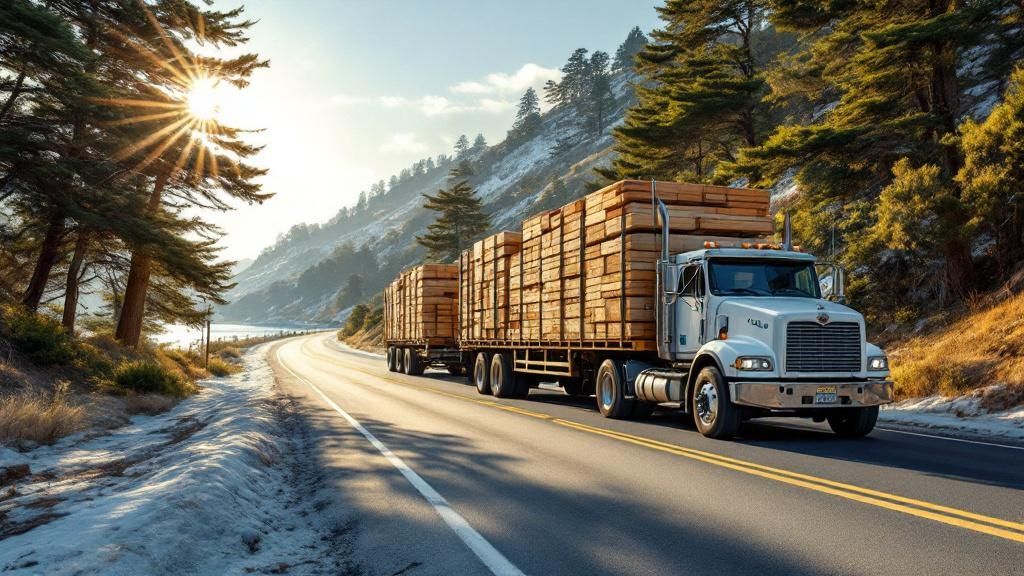
The market for sustainable wood products is set to hit roughly $250 billion by 2033, with North America leading the charge. This puts a spotlight on local suppliers who meet this demand responsibly. You can review the full market analytics for sustainable wood products for more details.
Expertise That Understands Bay Area Microclimates
A seasoned local supplier understands that wood for a deck in foggy Berkeley needs different properties than materials for a project in hot, dry Walnut Creek. This isn't just trivia; it's essential knowledge. They can recommend the right species and treatments that will actually hold up here, preventing expensive callbacks.
When Local Knowledge Makes a Difference
A local supplier becomes part of your team, offering insights a catalog or remote sales rep simply can't.
- Historic Restorations in Oakland: A local yard can help you source reclaimed lumber with a verifiable local story to preserve a Victorian's authentic character.
- Modern Builds in the Hills: An expert can guide you to engineered products like Glulam beams that meet our strict seismic codes and offer superior fire resistance.
- Coastal Projects in Alameda: Your local supplier knows which corrosion-resistant fasteners and naturally durable hardwoods will stand up to salt and moisture for decades.
When you source locally, you gain a partner invested in your project's success who understands the nuances of building in our unique region.
That level of detailed support is what separates a good supplier from a great one. It’s the kind of service we aim for at our contractor supply store in Berkeley.
Frequently Asked Questions about Eco-Friendly Lumber
For builders, architects, and homeowners in the East Bay, getting clear answers about sustainable materials is key to keeping projects on track and compliant with local standards.
1. Is eco-friendly lumber more expensive than conventional lumber?
While some high-end options like architectural reclaimed wood can carry a premium, many sustainable choices are cost-competitive. Engineered wood, for instance, often reduces on-site waste and labor time, which helps offset material costs and can increase a property’s market value.
2. Can reclaimed lumber be used for structural applications?
Yes, but it requires proper vetting and grading by a qualified professional. It's critical to work with a reputable supplier who provides documentation on the wood's species, origin, and strength. You will also need sign-off from a structural engineer and your local building department in Oakland or Berkeley.
3. What is the most important quality in an eco-friendly lumber supplier?
Transparency is key. A credible supplier will readily provide documentation like FSC Chain-of-Custody certificates. Beyond paperwork, look for deep local knowledge of the Bay Area’s climate and complex building regulations.
4. How does using sustainable wood help with green building certifications like LEED?
Using sustainable wood is a cornerstone of achieving LEED (Leadership in Energy and Environmental Design) credits in the "Materials and Resources" category. Prioritize FSC-certified wood, products with high reclaimed content, and regionally sourced materials to earn points toward your project's LEED goals. This is the kind of work championed by groups like our featured non-profit, Build It Green.
5. What are the best sustainable lumber options for decks in the Bay Area?
For outdoor projects, you need materials that can handle our diverse microclimates. Excellent options include FSC-certified hardwoods like Ipe, which naturally resist decay, and thermally modified wood, which is treated for incredible stability and rot resistance, making it ideal for siding and decking.
For expert advice tailored to your Bay Area project, connect with the team at Truitt & White. Visit our Berkeley showroom to explore our sustainable lumber options or get in touch with our specialists today.





